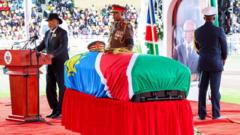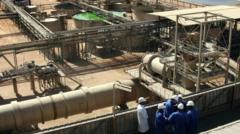The Namibian government has announced a halt to state funerals until April 2026 while a review committee examines associated costs and criteria, amid backlash over expensive burials, including significant expenditures on the recent funeral of founding President Sam Nujoma.
Namibia Suspends State Funerals Amid Cost Concerns

Namibia Suspends State Funerals Amid Cost Concerns
Amid rising criticism regarding the high costs of state funerals, Namibia has implemented a temporary moratorium on such ceremonies.
The Namibian government has recently placed a halt on all state funerals as a response to growing concerns about the soaring expenses associated with these ceremonies. The decision comes in light of public dissatisfaction with costs that have been perceived as excessive.
The moratorium, announced by Minister of Information and Communication Technology Emma Theofelus following a cabinet meeting, will be in effect until April 2026. The only person authorized to exempt specific funerals from this moratorium is President Netumbo Nandi-Ndaitwah. The government has indicated that a review committee will be formed to evaluate the criteria and processes for awarding official funeral status.
The rising costs of state funerals have been under scrutiny since at least 2021, with calls for examination growing particularly during the Covid-19 pandemic. Reportedly, the budget for state funerals saw a significant jump, with Prime Minister Elijah Ngurare revealing that the government allocated about 38.4 million Namibian dollars (approximately $2.2 million) for the 2024/2025 financial year. In stark contrast, only 2.1 million Namibian dollars were spent on 23 funerals during the 2022/2023 financial year.
The Windhoek Observer, a local publication, highlighted that the transport costs alone for founding President Sam Nujoma’s recent funeral amounted to 30 million Namibian dollars. Nujoma, who played a pivotal role in Namibia's fight for independence from South Africa, passed away earlier this year at the age of 95. After becoming Namibia's first president in 1990, he remained in office until 2005.
This moratorium symbolizes the government's intention to reassess its spending priorities in the wake of public dissatisfaction, as Namibia continues to navigate its financial landscape.






















